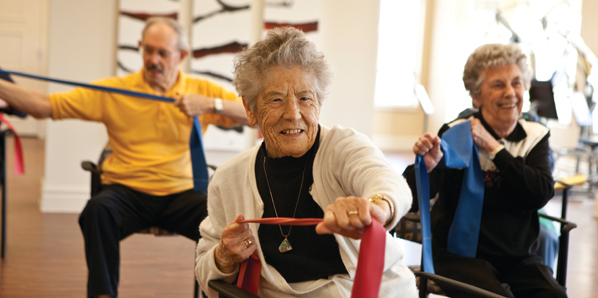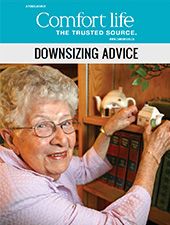Seniors Fight Depression Naturally With Exercise and Sleep
In my last post I looked at how seniors struggling with depression can experience a renewed sense of purpose and a vast improvement in outlook and mood by becoming socially engaged.
A second, yet equally powerful, way seniors can help themselves to alleviate depression naturally with the support of their caregivers and loved ones is to get exercise and a good night’s sleep.

Three benefits of exercise for seniors
- Exercise is crucial to health and well being -- both physical and psychological. When practiced consistently, exercise at any level will stimulate the release of those “feel-good” peptides called endorphins, which naturally boost and stabilize the mood.
- Exercise also improves strength and balance, enabling seniors to walk farther, stand for longer periods of time and generally function more freely. This makes it easier and far less frustrating to participate in day-to-day activities and remain socially engaged. Seniors who have never been particularly physically active find it especially exciting to discover the capacity to walk across a park, climb stairs or stand chatting with a neighbor for a while -- and to see this capacity progress.
- Regular exercise also supports a restful night’s sleep -- another crucial, natural mood regulator. We all know how important a good night’s sleep is to well-being, and how overwhelming it feels to be short on sleep. This is especially true for seniors, who often struggle with factors such as physical discomfort, illness and the side effects of medication that can disrupt sleep patterns. At the same time, it’s no secret that physical activity expends energy, causing a pleasing sense of exertion and fatigue that enhances sleep quality.
Simple ways to exercise
With a physician’s green light, seniors can embark on exercise programs including walking, stretching, balance work and light weightlifting. No fancy equipment is needed: simply walking down a hallway, lifting half-filled bottles of drinking water over the head or even dancing while seated in a chair can be enough to create a noticeable change.
And if regular physical activity is not enough to ensure a good night’s sleep, seniors and their caregivers should look for other potential impediments such as pain, medical conditions, the side effects of medications and frequent nighttime urination. All of these can be addressed and alleviated with the help of a physician.
By Kelley Richard
Kelley Richard is a Care Manager for LivHOME in Houston. A Licensed Master Social Worker, she has also served as crisis counselor and program therapist at Houston’s Intra Care Hospital and as a clinical social worker at the Houston Mental Health and Mental Retardation Authority. Richard holds a bachelor’s degree in social work from the University of Texas at Austin and earned her master’s degree in social work from the University of Houston Graduate School of Social Work.
LivHOME (www.livhome.com) is one of the United States' largest providers of professionally-led, at-home care for seniors.
*Second in a three-part series on steps seniors and their caregivers can take to combat depression
****
Related articles:
Helping a parent dispel the gloom of depression
Seniors and Depression: Fight it naturally with social engagement
Men and depression: Seven things you need to know—now
Four signs your elderly parent needs help at home
Have you found that your mood improved due to regular exercise? Help others by adding a comment below.


